
|
Today's Calendar |
| | Simply Economics |
| | International Perspective |
| | Resource Center |
 |
|
| 1999 Articles |
|
International Perspectives - November 22, 1999
Interest Rates and Oil Prices Revisited
Central Banks were busy last week...
Bank of Canada 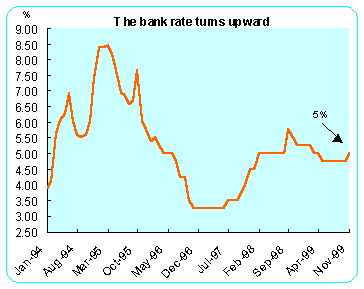 The Bank of Canada highlighted several reasons to justify the increase in borrowing costs. The country's unemployment rate was at a nine year low 7.2 percent in October, while the trade surplus is at a three year high and gross domestic product rose by a greater than expected 0.7 percent in August. The central bank also pointed to robust U.S. economic growth and demand, which has a strong positive influence on Canadian growth prospects. The Bank's action is designed to keep inflation well within the one to three per cent inflation target range set by the Bank. In this way monetary policy continues to support a sustainable rate of growth in output and employment in Canada.
Bank of England
Bank of Japan The Bank of Japan's November report said that industrial output is up but wages and demand remain weak and the economy is being dragged slowly back to health by growing demand for its products from bullish Asian neighbors. But the BoJ said had been little sign of a rise in consumer spending, or a drop in unemployment. Exports remain the driving force behind the more positive outlook. The BoJ said the Japanese economy was far from a full scale recovery, citing the weak momentum in private demand.
Oil - a progress report... The world's economies always have been sensitive to the supply and price of commodities, especially oil. Prices for oil rise for two reasons - demand is rising and OPEC producers are limiting supply. World growth has become more vigorous and more oil is being demanded for factories and businesses, bidding up the price of energy. At the same time, OPEC has, for the first time in many years, been able to enforce production quotas on its members. This has reduced bloated inventories and decreased the supply available. The net result has been higher prices. The oil glut is shrinking and some analysts are forecasting continued inventory erosion now that the heating season is here. Although OPEC appears set to adopt a status quo approach to quotas at this meeting, recent surveys suggest that some producers began to edge up production last month. However, a rapid reversal is always possible in a market that depends on the resolution of a few oil ministers to avoid temptation. As the price rises, the pressure to push up earnings by producing more oil becomes ever higher. However, the severe economic difficulties of many oil producing countries, such as Nigeria and Venezuela, appear to make discipline more likely. And although OPEC countries produce only about 40 per cent of the world's oil at present, they have nearly three-quarters of reserves. Oil prices rallied as OPEC members led efforts to reduce output by five million barrels a day, or about seven percent of total supply. The cuts were intended to eliminate surpluses. Observers have said that they have been surprised by the unity shown this year by OPEC, in contrast to previous attempts at production cuts, which were often undermined by cheating. But they suggested that they would be more difficult now to prevent some heavily indebted countries from cashing in on the higher oil price. The compliance of OPEC producers with output ceilings has not dropped as much as some believed as the September compliance level has been revised up to 91 percent from 86 percent and October compliance is down to 87 percent. The rise in oil prices has boosted the stock of the world's leading oil companies. In the period after 1985, when OPEC collapsed and oil prices fluctuated between about $15 and $20, the big oil companies made spectacular efficiency gains. The cost of finding, developing and operating a new source of oil has fallen to only about $6 per barrel, less than half the figures in the mid-1980s. But a higher oil price could be bad news for inflation, and lead to further interest rate increases around the world. As price reports are released almost every one has increased and that increase has been primarily attributable to oil. 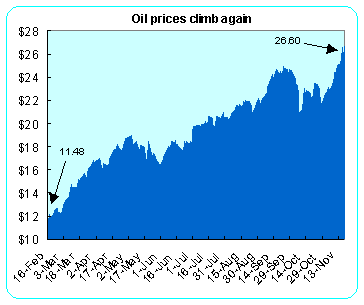 The price of crude oil rose above $26 a barrel, the highest level in almost three years, amid expectations that rising demand will outstrip production and eliminate the global surplus. This was after a mild respite during October from the continuous price increases that have been seen earlier this year. Many in the industry are hoping that a more reflective tone will emerge from the scheduled meeting in Riyadh of the Saudi Arabian, Venezuelan and Mexican oil ministers. The three countries - all of which are big suppliers to the United States, the world's largest oil market - were the architects of the original production restraint deal agreed in March 1998. The three, in common with other leading exporters, have already agreed to maintain the cuts until March 2000. The big question, but one that is unlikely to be answered full - at least publicly - is whether, and how, increased output could be engineered next year without triggering a steep price fall. That explains why some in the cartel argue so vehemently for a continuation of the cuts, irrespective of the actual state of world oil stocks and the level of global oil demand. But no doubt some of OPEC's more thoughtful ministers may wish the speculative fires of the futures' market had not been stoked so persistently and publicly.
Indicator scoreboard
Germany After the temporary pause in September, the Ifo Institute's west German business sentiment index rose again in October, though at a slightly slower pace than expected. The October reading rose to 96.1 from an unrevised 95.4 in September, due solely to an improvement in business expectations. Sentiment on current conditions fell for the second month in a row. The October index level as the highest since last August. 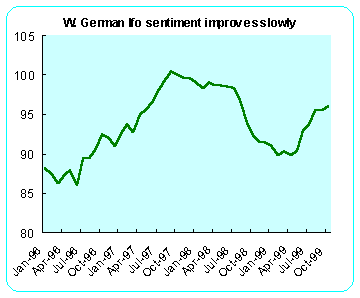
Britain October retail sales volume growth exceeded expectations and reached its highest annual rate in nearly two years. Retail sales volumes rose by 0.5 percent on the month and by 4.7 percent on the year. This was the highest annual rate since January 1998. For the quarter, retail sales volumes rose by 1.2 percent on the quarter and by four percent on the same three months a year ago. Again, the annual rate was the highest since March 1998. 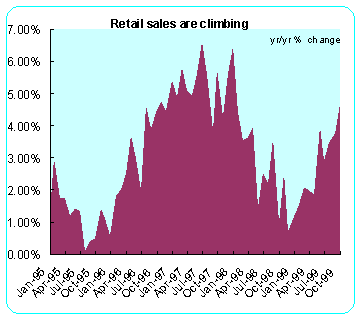 July-September average earnings rose 4.7 percent, easing from 4.9 percent in June to August, as the bonus effect reflected in the June data dropped out of the calculation. The result was closer to the 4.5 percent the Bank of England has said is compatible with achieving the inflation target.
Asia
Americas September's merchandise trade surplus narrowed to C$2.52 billion as exports dropped 3.2 percent and imports edged higher in the month. The trade gap and exports had hit record high levels in August. Exports fell 3.2 percent in September after a revised 3.5 percent gain in August, as exports in the auto industry plummeted 10.4 percent after hitting a record high the month before. Imports climbed 0.4 percent after August's 2.7 percent increase, primarily because of a strong increase in crude and fuel oil imports. Exports to the United States, Canada's largest market, decreased 3.7 percent. Imports from the United States were 0.2 percent higher in the month, leaving the trade gap at C$5.02 billion, down from August's record C$6.07 billion. 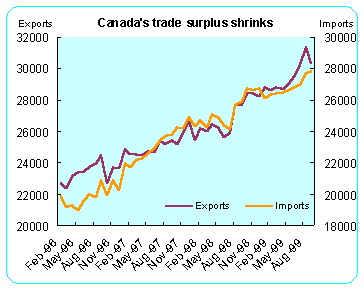 October's consumer price index edged up 0.1 percent. The increase is attributed to the 1.2 percent increase in energy prices. Excluding energy, the CPI remained unchanged from last month. When compared with last year, the consumer price index jumped 2.3 percent. While the increase continued to reflect the pattern of climbing energy prices that began in April, the rate of increase for the CPI slowed slightly from September's 2.6 percent year over year rise. Excluding energy prices, the CPI rose 1.5 percent. The increases in the energy index in September and October were the largest since early 1991.
Mexico
World Equity Markets
Asia 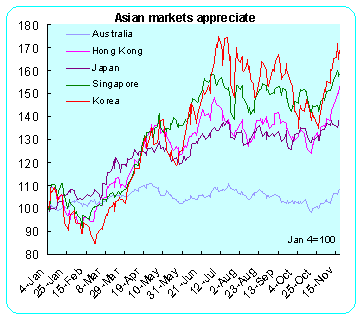 The Heng Seng index celebrated the United States/China trade agreement. The agreement, which paves the way for Chinese membership in the World Trade Organization, had been on the brink of failure and was saved only by last second concessions. China still has to hammer out agreements with the European Union, Canada and others before membership formally will be considered by the WTO. China will not be joining the WTO before the organization's summit meeting in Seattle at the end of the month. Europe 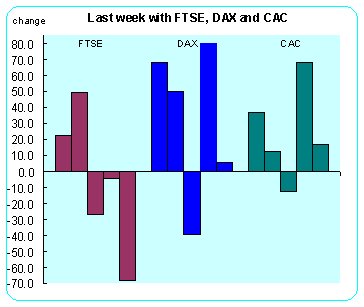 The FTSE sank 29 points or 0.45 percent. Instead of assaulting record peaks, the FTSE suffered its heaviest one day points loss in a month on Friday. The index was brought down by profit taking and the monthly expiry of the FTSE 100 option series along with an opening weakness on Wall Street. In addition, the FTSE was roiled by the proposed hostile takeover offer of Germany's Mannesmann by Britain's Vodafone, fueling speculation of more consolidation in the telecommunications sector.
Currencies 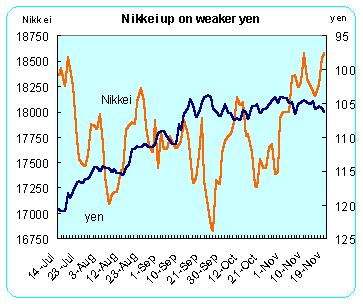
Europe 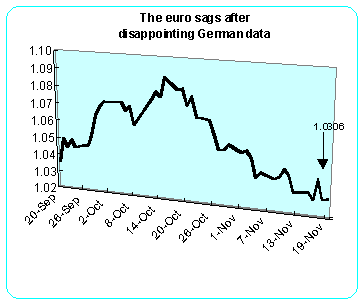
Sterling
Why U.S. investors should care...
Release dates are subject to change. |
||||||||||||||||||||||||||||||||||||||||||||||||||||||||||||||||||||||||||||||||||||||||||||||||||||||||||||||||||||||||||||||||||||||||||||||||||||||||||||||||||||||||